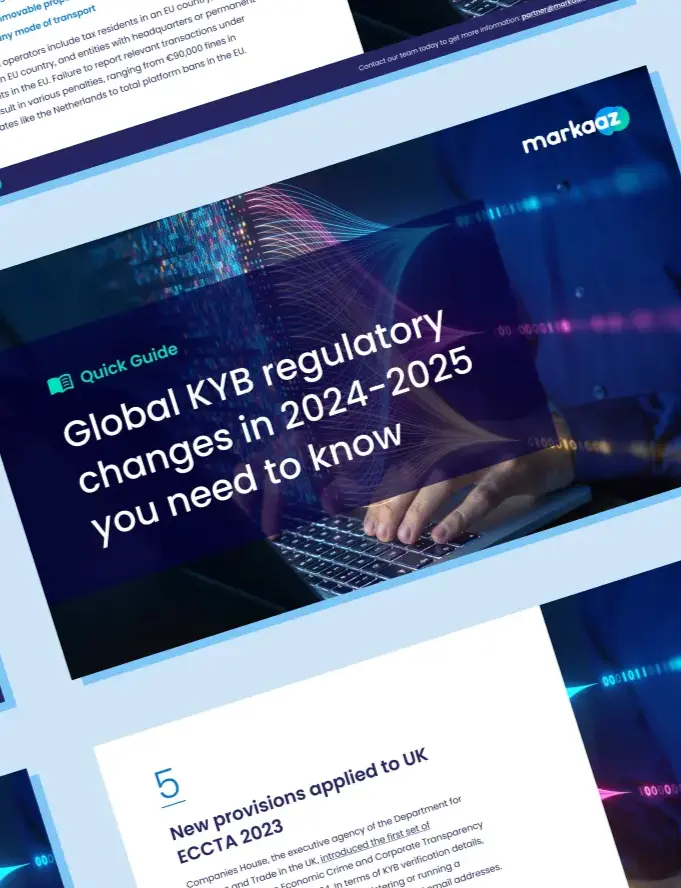
According to a recent Fintech Times report, more than half of banks don’t perform Know Your Business (KYB) checks. These checks are increasingly important, but they can be complicated and time-consuming, especially if you’re performing manual business verification.
KYB compliance is crucial in the current regulatory landscape. Doing business with illegitimate companies or those impacted by sanctions, for instance, can result in significant fines and reputational damage.
To streamline the process, here’s a guide to creating an effective KYB business verification system. We’ll discuss KYB in the context of the regulatory landscape, how to implement a risk-based KYB approach, and how to make KYB an integral element of your business operations.
Navigating the regulatory landscape
The regulatory environment surrounding business identity verification is fraught with potential obstacles that can cause problems even for discerning companies.
Anti-money laundering (AML) initiatives, such as the EU’s AML Directive and the US Patriot Act, require organizations to verify the identities of those they do business with and report suspicious activities. Similarly, the Bank Secrecy Act (BSA) has rules about the kinds of verification you need to perform and when and how to prove your system is adequate. For example, in Title 31, section 5325, the Act stipulates the kind of customer data a bank needs to collect before issuing a customer a cashier’s check greater than $3,000. This section also outlines an institution’s obligation to disclose details of its ID verification system to the Secretary of the Treasury.
One primary difference between domestic and international KYB regulations is the laws that control them. For instance, in the US, KYB is regulated by the BSA while KYB in the EU conforms to the AML Directive. This is significant because each has its own rules and consequences.
Additionally, it’s important to carefully examine the terms used in the applicable legislation. For example, according to Title 31—Money and Finance of the BSA, even if you’re “about to engage” in an act that violates the BSA’s regulations, you can be subject to a civil penalty. Similarly, in a press release detailing new AML regulations, the EU says institutions have to both verify facts about customers and “report suspicious activity.” In other words, even if there hasn’t been any confirmed fraudulent activity, the financial institution still has to report anything that raised suspicion.
How to implement a risk-based KYB approach
Mitigating risk is one of the primary goals of KYB. A risk-based KYB approach enables organizations to tailor their verification process based on the level of risk posed by each potential customer. Here are some steps you can take:
-
- Assess and categorize your business’s risk: This involves assessing the risk of fraud companies present to your organization. You then categorize them according to the level of risk they present.
-
- Tailor your KYB processes based on your risk assessment: If your assessment reveals a particular company poses a significant risk, build your KYB processes around mitigating these risks. For instance, if your company does business with companies in countries with lax KYB requirements, use an automated system that verifies both domestic and international business data.
-
- Continuously monitor and review your business relationships: Business principals can make poor decisions. They may inadvertently go into business with a terrorist, thereby putting your company at risk. As such, it’s important that you regularly conduct reviews of your customers.
One significant factor that can impact your KYB approach is the accuracy of the KYB information you have access to. Accuracy is paramount; inaccurate KYB data can lead to risky business decisions. A reliable KYB data provider like Markaaz can help. You can check the information you have against the Markaaz Directory, a comprehensive database containing 300+ million global business records. If the data aligns, your compliance team can proceed with the next steps. If not, you can decide whether to further investigate or reject the business partnership altogether.
Making KYB verification an integral part of business operations
To make KYB verification an integral aspect of your operations, it’s imperative that you set up internal policies and procedures for business verification. For example, make it mandatory to run all customer-provided information through a third-party service that specializes in KYB.
You can follow these steps to weave KYB into the fabric of your business:
-
- Provide training on KYB requirements: Members of your compliance and customer-facing teams should understand what KYB involves and how to identify potential issues. For instance, if a business attempts to purchase goods or services using another company’s checking account, this could be a sign they’re laundering money.
-
- Ensure efficient and user-friendly KYB processes: Your KYB systems should be straightforward enough for even new employees to understand, particularly those who are still learning how to handle KYB checks.
-
- Consider data privacy and protection issues: By making sure you stay in line with the California Privacy Rights Act, HIPAA, the EU’s GDPR, and other applicable compliance requirements, you can reduce the risk of fines or reputational damage.
Establish an effective KYB verification system today
Navigating the complicated KYB regulatory landscape starts with assessing your risks of doing business with fraudulent companies or those involved with money laundering, then using what you find to set up a verification system that protects your organization. By making KYB a central element of your operations, you can reduce the risk of falling out of line with regulatory standards and ending up a victim of fraud.
When added to your KYB waterfall, Markaaz can fill crucial gaps in your data coverage. We have the SMB data other providers lack and can cover businesses of all sizes from around the world. With Markaaz, you can reduce false positives and negatives and reliably verify businesses in as fast as 2 seconds. Reach out to our team to learn more.



